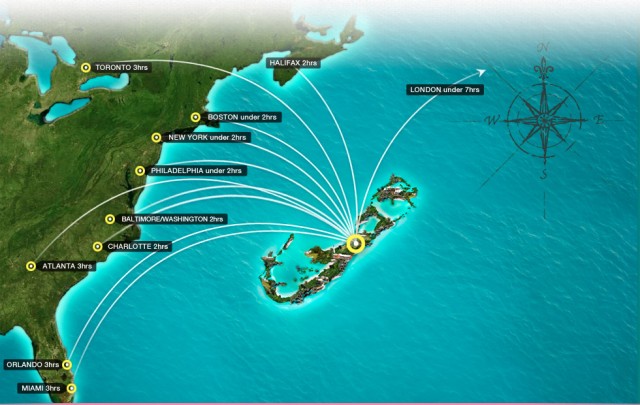Bermuda
BERMUDA IS A UNITED KINGDOM overseas territory located 700 miles southeast of NEW YORK CITY in the North ATLANTIC OCEAN. With an area of 36.2 square mi (53.3 square km), the island colony has a population of 64,482 (2003). Bermuda is a primary tourism destination for East Coast Americans, and its capital, Hamilton, serves as a harbor for numerous cruise ships.
In 1506, a Spanish sea captain, Juan de Bermudez, came upon uninhabited islands in the middle of the Atlantic Ocean and named them Bermuda. Although Bermudez did not claim the land for SPAIN, the islands did become an important landmark for seafarers crossing the ocean from Spain to the New World. In 1609, an English admiral, Sir George Somers, was sailing from England to the new British settlement, Jamestown, VIRGINIA, in the New World. He landed in Bermuda and built replacement ships. Two men were left behind and claimed the land for Britain.
The British Jamestown Company soon became interested in the islands and three years later brought over 60 settlers to organize a settlement. Tobacco, cedar, whaling, and salt were vital to the early Bermudan economy. As the years passed, cedar forests were cleared for areas of land capable of cultivating potatoes, cabbages, onions, and tobacco.

Slaves were transported to the islands in 1616, and in 1684, Bermuda became a British colony. During the American Revolution, the Bermudan citizens remained loyal to the British, and in the War of 1812, the British navy used Bermuda as a base. The Royal Naval Dockyard on the western end of the island proved vital in maintaining British superiority in the North Atlantic. In 1834, slavery was abolished and around 5,000 slaves were freed. During the Civil War, Bermuda became a center for southern blockade-runner ships, which would attempt to break the Union naval blockade.
In 1874, the government of Bermuda and the Quebec Steamship Company agreed on a contract that created steamship service between NEW YORK CITY and Bermuda. Bermuda was becoming a popular vacation destination for many people, including the famous American author Mark Twain, and the tourism industry expanded.
In 1937, Darell's Island Marine Airport was opened and air travel began to and from Bermuda. Six years earlier, a railroad was built in the territory. When World War II began, the strategic location of the islands proved vital. Part of the lend-lease agreement between Britain and the United States resulted in a portion of Bermuda being handed over to the American military. After World War II, women were allowed to vote and black voters were given greater freedom. A constitution was signed in 1968, which allowed for full self-government but left security and diplomatic affairs to the British.
The territory was affected by race riots throughout the 1970s, but in the 1980s, the construction industry prospered. Construction resulted in an incredible expansion and employment grew 34 percent. However, the economy faltered in the 1990s and many Bermudans called for full independence from Britain. In 1995, after only 58 percent of the electorate voted, a referendum failed to gain enough votes for independence. That same year, the naval bases occupied by the American military since World War II were handed back to the Bermudan government.
By 1998, the Progressive Labor Party's Jennifer Smith, was selected as the premier. She became the first woman and the youngest person to hold the post. In 2003, Alex Scott became premier. Bermuda is prospering economically and continues to attract a multitude of international companies and holiday seekers.